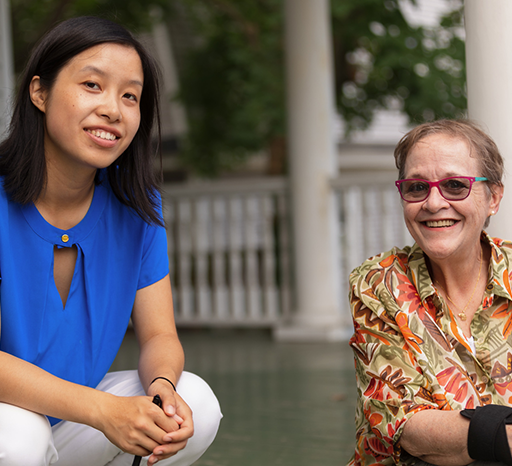Accessory dwelling units might be one of the ways to tackle the problem
As rising housing costs threaten to push out many Rhode Islanders, Sen. Victoria Gu is sponsoring a package of bills to help residents afford homes or rentals.
“If
you have roots here, you should be able to afford to stay here,” said Senator
Gu (D-Dist. 38, Charlestown, Westerly, South Kingstown). “In South County, we
keep seeing ‘luxury condos’ or single-family housing being built that are
priced beyond the reach of young adults who want to stay in their hometown and
start a family, seniors looking to downsize and a lot of people in
between.”
At
a recent forum at Westerly Library, organized by Senator Gu, advocates
described the impact of high housing costs locally.
“In
40 years, I’ve never seen what we’re seeing now,” said Russ Partridge,
executive director of the WARM Center, a homeless center in Westerly. “We have
people who are 65 years old, lived in this community and worked their whole
lives, are now homeless coming to us for help. I don’t know how to convey how
bad this crisis is.”
Senator Gu is hoping that a renewed focus at the state and town level and more creative approaches will help with housing affordability.
“I’m introducing a bill with Rep. June Speakman (D-Dist. 68, Warren, Bristol) that will enable more homeowners to utilize Accessory Dwelling Units (ADUs). ADUs offer the ‘missing middle’: housing that is smaller, more affordable and smartly repurposes our existing buildings and garages,” said Senator Gu.
“Homeowners can be a part of the solution to the housing crisis by creating or
converting a garage, basement or shed into an ADU and offering it as a
long-term rental. Then they have the benefit of receiving some additional
income or housing a loved one. It’s a win-win.”
ADUs
are accessories to existing housing, either as a conversion of part of a house
(such as a walkout basement), an attachment to a house or a smaller, detached
dwelling. They have become increasingly popular around the country in recent
years as states and municipalities struggle to balance the needs of expanding
the housing stock while preserving the feel of residential neighborhoods.
Seniors, especially, have taken to ADUs as a way to downsize while staying in
the community they love.
Right
now, most towns and cities in Rhode Island, including Westerly and Charlestown,
allow ADUs if a family member is going to live in it. South Kingstown already
allows ADUs for family members or rentals. Current state law also allows an ADU
for anyone to live in if the lot is larger than 20,000 square feet
(approximately half an acre) and the ADU is a conversion of a pre-existing
structure.
Senator Gu's bill would allow homeowners to convert a part of their existing house or another pre-existing structure, like a garage, into an ADU if the lot is smaller than 20,000 square feet. If the lot is larger than 20,000 feet, the homeowner would be allowed to build a small, detached structure up to 900 square feet (less than 5% of the lot size).
Compared to a basement or attic,
this structure will be much more accessible to seniors. All ADUs must
satisfy building code, DEM and CRMC regulations and zoning regulations such as
setbacks. For ADU’s allowed under this bill, either the primary dwelling or the
ADU must be owner-occupied. The ADU could not be used for short-term rentals.
“We’re
building an ADU for my son right now, which is a great option for our family,”
said Ted Rice, who lives in Westerly. “But if he were to move out, under
current law, we won’t be able to rent it. So we’ll have a dwelling that no
one’s allowed to live in. With so many people looking for long-term rentals,
that just doesn’t make sense.”
Catherine
Taylor, AARP Rhode Island state director, called the ADU bill her
organization’s “top priority.”
“ADUs
allow older adults to remain in the communities they love, build in support
from family and caregivers or supplement their fixed incomes,” Taylor said.
“Let’s get this done.”
Another
bill (2023-S
0788) Senator Gu is working on would allow municipalities, if they choose,
to levy up to a 2% real estate transfer tax on home sales over $800,000 and
dedicate that money to affordable housing. Block Island has a similar program
dedicated to preserving open spaces.
A
third bill (2023-S
0254) would provide additional state funding for schools in any town that
exceeds their affordable housing goal. For each percentage point over the 10%
goal, the town’s school district would receive a 2% increase in funding.
A fourth bill (2023-S 0876) would remove a loophole that allows developers to avoid building affordable units. In many towns, according to local zoning, all new developments above a certain size must set aside 10-20% of their units as affordable, but developers have often bypassed this requirement by paying an approximately $45,000 fee per unit.
Because housing prices are so high, most developers make
more profit by paying the fee. The bill would also require the affordable units
in a development to be comparable in size and quality to the market rate units.
“There
are so many pieces to this problem that we need to tackle,” said Senator Gu.
“We need more housing at all price points: for families just starting off,
seniors looking to downsize and everyone in between. The tricky part is
encouraging more housing while preserving our neighborhoods. We can do both
with smart planning. We owe it to our community to get this right.”
